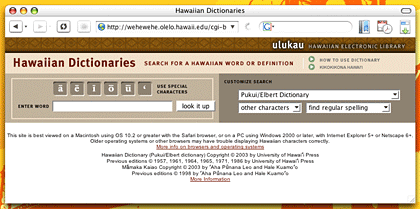
[ EXCLUSIVE ]
COURTESY OF ULUKAU.ORG
The most popular resources at www.ulukau.org are the two Hawaiian dictionaries.
First Hawaiian
electronic library
to be unveiled todaySeveral local groups have been
digitizing data and locating
archived documents
A vast collection of Hawaiian language, history and culture is just a click away on the Internet.
"The beauty of this electronic library is that native Hawaiians all over the world have access to these materials that have up to this point been available in archives and libraries in Honolulu," said Mahealani Merryman, library director at Alu Like Inc., a nonprofit organization that provides social services to more than 17,000 native Hawaiians.
Officials are expected to present the first Hawaiian electronic library at the fifth Native Hawaiian Education Association Convention at Windward Community College today and tomorrow. Those interested in the Web site can go to ulukau.org.
For three years, organizations including the University of Hawaii at Hilo's College of Hawaiian Language, Hale Kuamo'o, Alu Like, Bishop Museum and Kamehameha Schools have been digitizing materials and locating archived documents to put on the Web site to help others learn and perpetuate the Hawaiian language and culture. More Hawaiian resources will be added.
"The goal of the Web site is to put all Hawaiian language archival documents" on the Web site, said Merryman.
The Web site was created in both Hawaiian and English and includes five sections: "The Legacy: Journal of Hawaiian Language Resources," a Hawaiian newspaper collection, the Hawaiian Bible, two Hawaiian dictionaries and a book called "Kamehameha and His Warrior Kekuhaupi'o."
The most popular resources on the Web site are two Hawaiian dictionaries -- the Mary Kawena Pukui and Samuel H. Elbert dictionary and the Mamaka Kaiao dictionary -- that are cross-searchable.
Two issues from Volume 1 of "The Legacy: Journal of Hawaiian Language Resources" are available in three text versions: the original version, modern version and English-translated version. They provide information on historic government documents such as the constitution that was established in the reign of King Kamehameha III as well as Hawaiian stories, chants and other literature. The site also displays digital images of the original resource.
Moreover, the issues are available in an audio version so students or those interested in learning the Hawaiian language can hear the correct pronunciation of words.
The newspaper collection offers articles from five newspapers published between 1834 and 1948, while the book "Kamehameha and His Warrior Kekuhaupi'o" describes the early days of King Kamehameha I, the Hawaiian kingdom and the arrival of missionaries.
Officials plan to expand the newspaper and journal section of the Web site soon. All sections, with the exception of the newspaper collection and the Hawaiian Bible, are now available in Hawaiian and English. Officials said the Hawaiian Bible will be translated to English.
The Web site was first posted on the Internet in September and received 1,500 hits that month after officials presented the Web site at Kamehameha Schools and immersion schools throughout the state to teach students how to use it. The number of hits increased to 150,000 last month.
"It's really exciting. It overwhelms me. The response has been gratifying," said Kalena Silva, director for the College of Hawaiian Language at the University of Hawaii at Hilo.
Of the hits, 49 percent went to the Web site's Hawaiian text sections, said Silva.
Officials expect the number of hits to jump once the general public learns of the Web site.
Before the Web site was posted on the Internet, students working toward their master's degree in Hawaiian language and literature at UH-Hilo would travel to Honolulu to research archived materials that were not available on campus, said Keiki Kawai'ae'a, program director for Hale Kuamo'o, which develops instructional material for the state's immersion programs.
"They had to fly to Honolulu to get these resources, which was not cost-efficient," said Kawai'ae'a.
She added that the Web site is also useful to people worldwide who are interested in the Hawaiian language.
"Daily, we get e-mails and phone calls from people all over the world for help on the Hawaiian language," said Kawai'ae'a.
Merryman said a committee will be created to select future materials to be added to the Web site.
"In this age of technology, this is the best vehicle to date for perpetuating the Hawaiian language, literature and traditions and values of the host culture," said Winona Rubin, board chairwoman and acting chief executive officer of Alu Like. "This generation and future generations will benefit from this."
